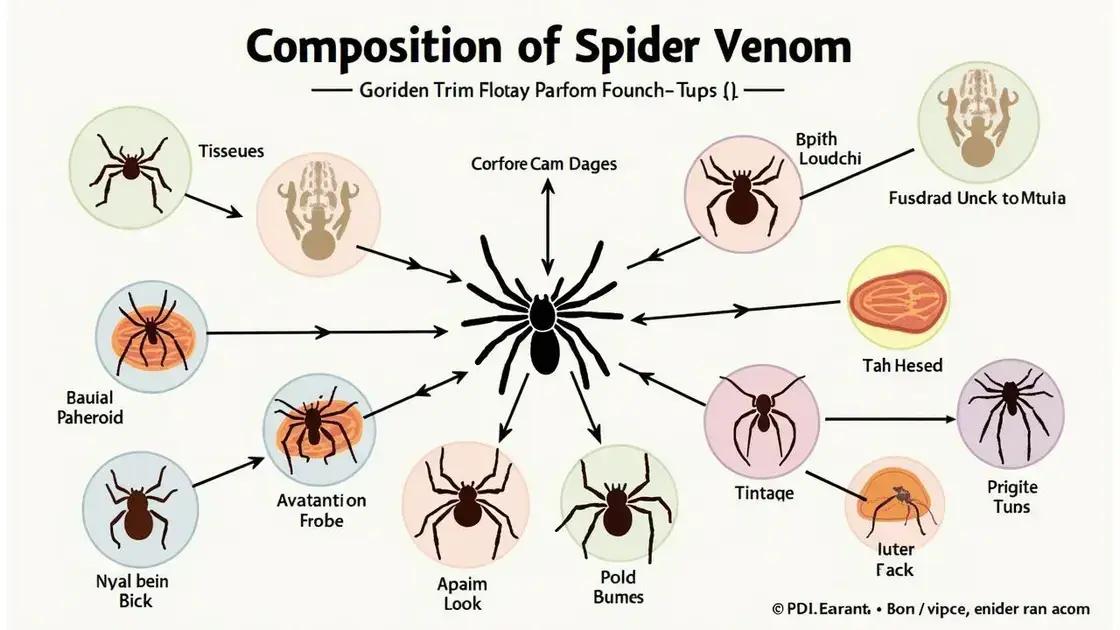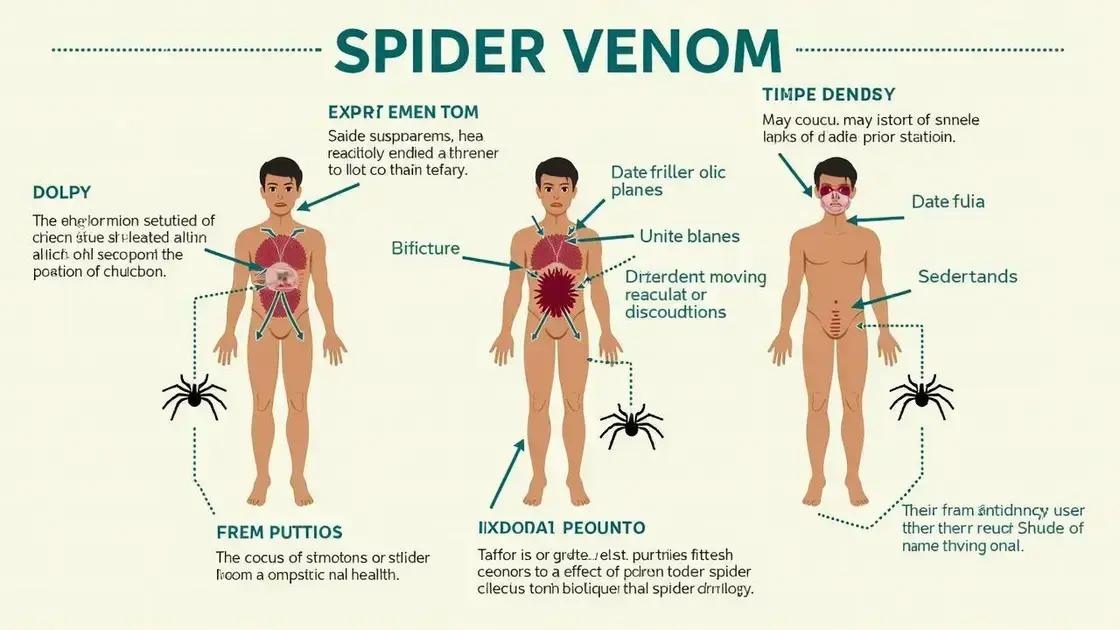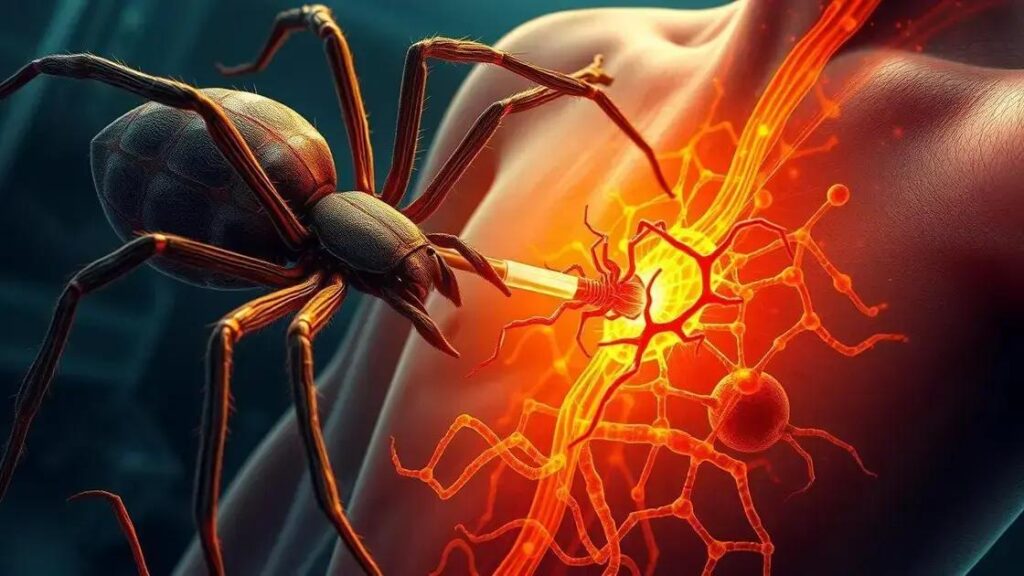Understanding how spider venom trick works in the body reveals its complex effects, including paralysis and tissue breakdown, which can lead to various health issues ranging from mild irritation to severe reactions, depending on the spider species.
Spider venom has fascinated scientists and the public alike for centuries. Understanding how does the Spider Venom Trick work in the body can reveal vital insights into both biology and potential medical applications. Venom isn’t just a tool for predation; it has intricate effects on human health. In this post, we will dive deep into the mechanisms of spider venom and its surprising impact on our physiology.
Understanding Spider Venom Mechanism

Spider venom is a complex cocktail of proteins, peptides, and enzymes, each contributing to its unique effects on prey. Understanding the spider venom mechanism involves studying how these chemicals interact biologically. Venom components can vary greatly among different spider species, which allows them to target specific organisms effectively.
The Composition of Spider Venom
Spider venom is primarily composed of proteins that can affect biological processes. These proteins can cause paralysis, disrupt cellular functions, or facilitate digestion by breaking down prey’s tissues. The variation in venom composition is a result of evolutionary adaptations to specific prey and environments.
How Venom Works
When a spider injects venom into its prey, it can immediately start breaking down tissues. This enzymatic action allows the spider to feed on the liquefied insides of its victim. The venom also contains neurotoxins that target the nervous system, leading to paralysis.
Effects on the Body
For humans, the effects of spider venom vary based on the type of spider. Some venoms can cause mild irritation, while others can lead to severe medical conditions. The body responds by sending immune responses that can result in inflammation, pain, or even necrosis in severe cases.
Research into spider venom has revealed potential medical applications. Scientists are exploring whether these venom components could help in developing medications for pain relief or treatments for certain diseases.
Effects of Spider Venom on Human Health

Spider venom can have varying effects on human health, depending on the type of spider involved. Common symptoms of a spider bite may include pain, swelling, and redness at the site of the bite. Some more serious bites can lead to systemic reactions that affect the entire body.
Common Reactions
After a spider bite, the body often reacts with inflammation as part of the immune response. This can lead to symptoms such as fever, chills, and muscle pain. In some cases, people may also experience nausea or vomiting.
Severe Reactions
In rare cases, certain spiders like the black widow or brown recluse can cause severe health issues. The black widow’s bite can lead to muscle cramps, severe pain, and even life-threatening conditions if not treated properly. The brown recluse bite may cause necrosis, leading to tissue death around the bite site.
Long-Term Health Effects
While most spider bites are harmless and resolve quickly, some individuals may experience long-term effects. Chronic pain, skin changes, and anxiety about future bites can occur in some people. Understanding the effects of spider venom on human health is crucial for due awareness of potential dangers and treatments.
In the medical field, research into spider venom is ongoing, as certain venom proteins show promise for use in new therapies, improving pain relief, or treating diseases.
Understanding the Importance of Spider Venom Research
From the mechanism by which spider venom operates in the body to its various effects on human health, it is clear that spider venom is a complex and powerful biological substance. Research into spider venom not only informs us about potential medical applications but also helps in designing treatments for bites that can cause serious health issues.
By further understanding how spider venom affects humans, we can better prepare ourselves for exposure and improve treatment options. The ongoing scientific examination of this unique natural resource may one day lead to breakthroughs in medicine and pain relief.
Thus, it is essential to continue exploring the fascinating world of spider venom, which holds the potential to change our approach to certain medical conditions and enhance our knowledge of human biology.
FAQ – Frequently Asked Questions about Spider Venom
How does spider venom work in the body?
Spider venom affects the body by targeting nervous systems and breaking down tissues, leading to various symptoms depending on the species.
What are the common effects of spider bites?
Common effects of spider bites include pain, swelling, redness, and in some cases, more severe reactions like nausea or muscle cramps.
Which spiders are most dangerous to humans?
The black widow and brown recluse spiders are among the most dangerous, causing serious health issues when bitten.
Can spider venom be used for medical treatments?
Yes, researchers are exploring the medical applications of spider venom, including pain relief and treatments for specific diseases.
What should I do if bitten by a spider?
If bitten by a spider, seek medical attention, especially if you experience severe pain, muscle cramps, or other serious symptoms.
Are all spider bites harmful?
No, most spider bites are harmless and resolve quickly, but some can cause severe reactions depending on the spider species.













